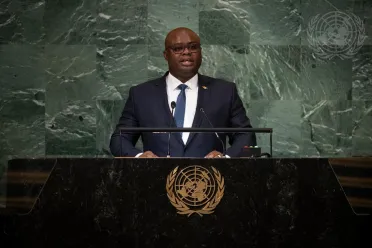Statement
Statement summary
BERNARD GOMOU, Prime Minister of Guinea, noted that after setting the tone for independence in Africa, particularly in Francophone nations, his country has experienced dark times in its governance — and unfortunately, during the last decade, the regime in place was no exception. The period was marked by extreme politicization of State bodies, violations of the rule of law and financial mismanagement. The former President’s constitutional change removing presidential term limits was the triggering factor of sociopolitical unrest in a nation where development was already paralyzed — even though it is the world’s largest producer of bauxite. Faced with the disastrous situation, the Forces of Defense and Security Forces, within the National Committee of Reconciliation and Development, decided to take responsibility on 5 September 2021 to establish a virtuous Government for the benefit of the Guinean people — in particular women and the young — for inclusive and sustainable development.
The population supported the move, he emphasized, and an overview was taken of appropriate solutions to the challenges of recovery, including: building strong and legitimate institutions; refounding the State to restore its authority; recovery, modernization and renewal of the Administration; and rallying the people in conducting public affairs in full transparency. The country developed and published the Transition Charter and a Civilian Transition Government, established the National Transition Council and the Court of Repression of Economic and Financial Offences to fight corruption and embezzlement of public property and restore confidence between the people and the authorities. All proceedings are based on the full independence of the judiciary, with the organization of national conventions of “Days of Truth and Forgiveness”, which submitted a report on 24 August.
He noted a proposed timeline was obtained by consensus, with a view to preventing the people of Guinea from falling back into cyclical transitions. As a central point of negotiation between Guinea and the Economic Community of West African States (ECOWAS), he emphasized that the content of the transition involves 10 points, including a general population and housing census and a civil status administrative census. Those programmes will take 24 months, and the country will need an additional 12 months for holding the three scheduled elections. He stressed the urgent need for that quality census to ensure an indisputable electoral registry, guaranteeing transparent electoral processes and results acceptable by all.
On that point, he emphasized that the members of the National Committee, the Government and the National Transition Council — without any pressure, and of their own free will — decided not to run for office during the upcoming elections. The Guinean Government further has made a national priority of organizing a trial of the events of 28 September 2009 on behalf of those who were victimized. After a 13-year wait, the President of the Transition decided to open the trial in cooperation with the International Criminal Court and the Human Rights Council. On the economic front, he noted Guinea’s efforts to stabilize the economy through an Interim Reference Programme 2022-2025, contributing to improving living conditions, and reassuring all public and private investors of the Government’s intention to guarantee favourable business climate conditions. Public finance and the mining sector will be overhauled, setting the index price of bauxite and allowing the population to benefit from the dividends of growth in that sector.
His country shares the concerns of the international community on issues of peace, security, development and human rights. Since 1861, Guinea has deployed troop and police contingents in various peacekeeping missions around the world. In addition to deployment within the United Nations Multidimensional Integrated Stabilization Mission in Mali (MINUSMA), operating since 2013, it has deployed an additional contingent to replace the Benin contingent whose mandate expires in 2023. Calling for United Nations reform, he stressed the Organization must be fairer, more inclusive and ready to respond to the legitimate aspirations of the peoples of the world and adapt to international realities. He cited the importance of the Ezulwini Consensus and the Sirte Declaration, which express the shared African position on Security Council reform. Guinea has adopted inclusive dialogue, including with ECOWAS, on strengthening of the rule of law, promoting human rights and ensuring accountability to mend the torn social fabric.
Full statement
Read the full statement, in PDF format.
Photo

Previous sessions
Access the statements from previous sessions.
